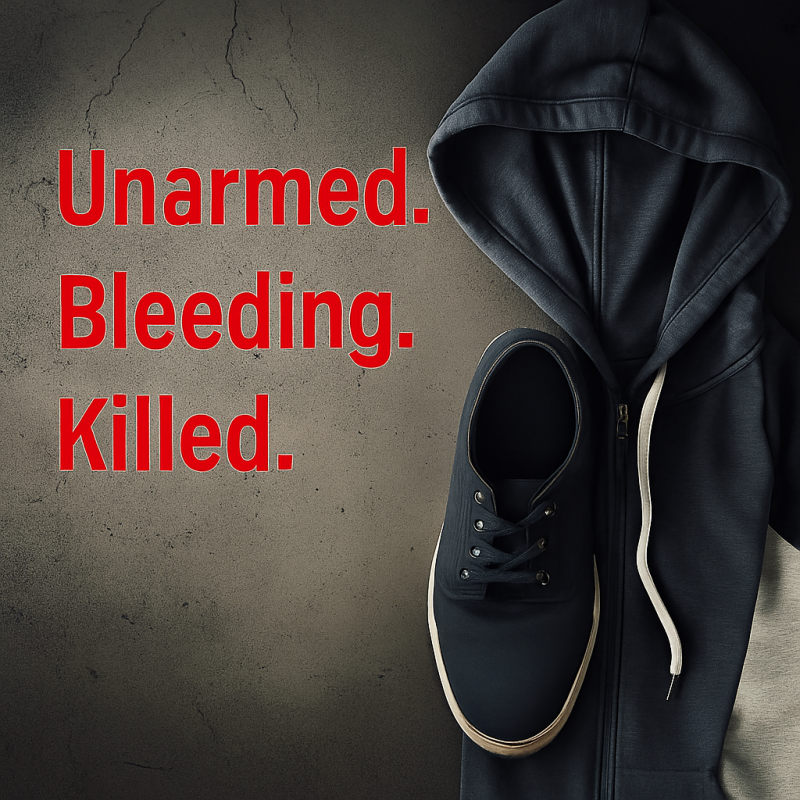
There are some stories that don’t leave your heart. They carve themselves into your conscience and whisper a truth you didn’t want to know — that sometimes, even when you cry for help, the system answers with bullets. One of those stories is Feras Morad’s.
Feras was 20 years old. A bright, young Muslim man. He had a debate championship under his belt and a future in law. He was the kind of son any mother would be proud of. But none of that mattered on May 27, 2015, when Long Beach police officers encountered him — not as a human being in crisis, not as someone needing help, but as a threat
Let’s be clear: Feras had fallen from a second-story window after what friends said was a bad experience with hallucinogenic mushrooms. He was injured, dazed, shirtless, and bleeding. He was unarmed.
Let me say it again: he was unarmed.
The officers on scene didn’t see someone who needed medical attention. They didn’t call a crisis team. They didn’t try to de-escalate. They saw a “brown” body, a young man disoriented and confused — and they assumed danger. They used a taser on him. And then, they shot him dead.
They executed him in a moment when compassion could have saved his life.
As a Pakistani woman and a Muslim, this hurts on a level that is hard to articulate. Our communities already live in fear — of being misjudged, of being targeted, of being seen as “less than” simply because of how we look, what we believe, or how we express our pain.

Feras Morad needed help. He needed an ambulance, not a gun. He needed care, not fear. He needed understanding, not judgment. But what he got — what so many young men of color get — was brutality masked as “protection.”
How many more Feras Morads? How many more cries for help will end with a death certificate?
This is not just about Feras. It’s about a system that continues to fail Black and brown men, especially those dealing with mental illness. Consider:
- Elijah McClain, a 23-year-old Black massage therapist who was walking home from a convenience store. He wore a ski mask because he was anemic and often cold. Police tackled him, put him in a chokehold, and paramedics injected him with ketamine. He was unarmed. He died in the hospital days later.
- Eric Salgado, 23, a Latino man, shot over 40 times by California Highway Patrol officers in 2020. He was in a car. No weapon was ever recovered.
- Daniel Prude, a 41-year-old Black man, was experiencing a mental health episode. His brother called for help. Rochester police pinned him to the ground, naked in the snow, and held a bag over his head. He suffocated to death.
- Christian Hall, 19, a Chinese American adoptee, was in a mental health crisis and called 911 himself. He was on an overpass when Pennsylvania State Troopers shot him — with his hands in the air.
What is it about brown skin and Black bodies that makes them disposable in the eyes of law enforcement?
How is it that mental illness, something that should evoke compassion, becomes a death sentence when the person suffering isn’t white?
Feras’ parents did not deserve this. His friends did not deserve this. He deserved a chance to recover, to grow, to live. I don’t care what drugs were in his system. He was human. He was vulnerable. He deserved to be treated as such.
Every mother of color now lives with the knowledge that if their child ever has a mental health emergency — if they ever get too overwhelmed, too anxious, too scared — calling 911 might be the last thing they ever do.
This is the legacy of policing in this country. And no amount of reform will change that until we confront the deep racism, fear, and cruelty baked into the very foundation of how we respond to people in need.
To Feras’ family, I say: Inna lillahi wa inna ilayhi raji’un — surely we belong to God and to Him we shall return. May Allah grant your son peace and grant you justice in this life and the next.
But to the system? I have no prayer — only fire. We are watching. We are grieving. And we are rising.
Because the next Feras shouldn’t have to die for people to finally see the problem.
End qualified immunity. Fund crisis response teams. Stop killing our sons.
Add comment
Comments